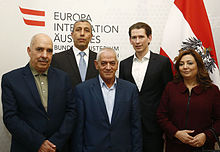
Thorbjørn Jagland is a Norwegian politician from the Labour Party. He served as the secretary general of the Council of Europe from 2009 to 2019. He served as the prime minister of Norway from 1996 to 1997, as the minister of Foreign Affairs from 2000 to 2001 and as the president of the Storting from 2005 to 2009.

The Norwegian Nobel Committee selects the recipients of the Nobel Peace Prize each year on behalf of Swedish industrialist Alfred Nobel's estate, based on instructions of Nobel's will.

The Tunisian General Labour Union is a national trade union center in Tunisia. It has a membership of more than one million and was founded January 20, 1946.

The 2009 Nobel Peace Prize was awarded to United States president Barack Obama for his "extraordinary efforts to strengthen international diplomacy and cooperation between peoples". The Norwegian Nobel Committee announced the award on October 9, 2009, citing Obama's promotion of nuclear nonproliferation and a "new climate" in international relations fostered by Obama, especially in reaching out to the Muslim world.

The Nobel Peace Prize is one of the five Nobel Prizes established by the will of Swedish industrialist, inventor, and armaments manufacturer Alfred Nobel, along with the prizes in Chemistry, Physics, Physiology or Medicine, and Literature. Since March 1901, it has been awarded annually to people who have "done the most or the best work for fraternity between nations, for the abolition or reduction of standing armies and for the holding and promotion of peace congresses." The Oxford Dictionary of Contemporary History describes it as "the most prestigious prize in the world."
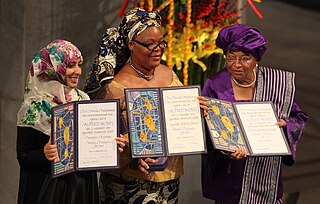
The 2011 Nobel Peace Prize was jointly awarded to three female political activists. Two African and one Asian female were awarded for their persistence in obtaining equal rights for women.

The 2012 Nobel Peace Prize was awarded to the European Union (EU) "for over six decades [having] contributed to the advancement of peace and reconciliation, democracy and human rights in Europe" by a unanimous decision of the Norwegian Nobel Committee.
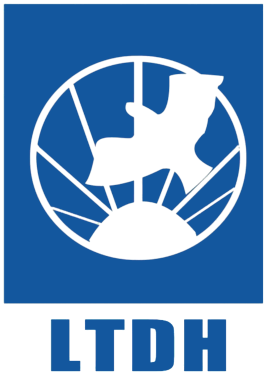
The Tunisian Human Rights League is an association to observe and defend human rights in Tunisia. It was founded in 1976, but associations had to be government-recognized, and the government delayed considerably before giving official recognition in May 1977. The organization's name is usually abbreviated LTDH, for its French name.

The Tunisian National Dialogue Quartet is a group of four civil society organizations that were central mediators in the effort to consolidate democratic gains and form a lasting constitutional settlement in Tunisia following the unrest and historic regime change of the 2011 Jasmine Revolution.[1]
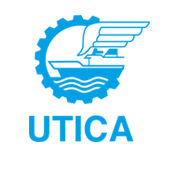
Tunisian Union of Industry, Trade and Handicrafts or UTICA is an employers' organization in Tunisia representing industrial, trade and craft sectors. On October 9, 2015, the National Dialogue Quartet, comprising UTICA, the Tunisian General Labour Union, the Tunisian Human Rights League and the Tunisian Order of Lawyers, was announced as the laureate of the 2015 Nobel Peace Prize "for its decisive contribution to the building of a pluralistic democracy in Tunisia in the wake of the Jasmine Revolution of 2011".
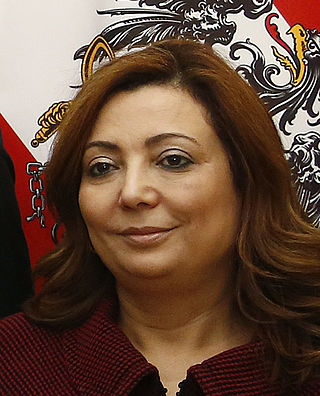
Wided Bouchamaoui, also transcribed Ouided Bouchamaoui, is a Tunisian businesswoman who since 2011 has been leader of the Tunisian Confederation of Industry, Trade and Handicrafts (UTICA). As leader of the organization she took from 2013 part in Tunisian National Dialogue Quartet which led the latter organization to receive the 2015 Nobel Peace Prize. The French news magazine Jeune Afrique has identified her as one of the Top 25 Business Women in Africa. In 2014 she won the Oslo Business for Peace Award for her work in UTICA.

The 2016 Nobel Peace Prize was awarded to the President of Colombia Juan Manuel Santos "for his resolute efforts to bring the country’s more than 50-year-long civil war to an end, a war that has cost the lives of at least 220,000 Colombians and displaced close to six million people." The conflict is the longest running war, and last remaining guerrilla struggle, in the Americas. The Nobel Peace Prize is awarded annually to those who have "done the most or the best work for fraternity between nations, for the abolition or reduction of standing armies and for the holding and promotion of peace congresses". The announcement was made on 7 October at a press conference at the Nobel Peace Center, and the formal award ceremony took place on 10 December at the Oslo City Hall.

The 2018 Nobel Peace Prize was awarded to Denis Mukwege and Nadia Murad "for their efforts to end the use of sexual violence as a weapon of war and armed conflict," according to the Norwegian Nobel Committee announcement on 5 October 2018 in Oslo, Norway. "Both laureates have made a crucial contribution to focusing attention on, and combating, such war crimes," according to the award citation. After reading the citation, Committee Chair Berit Reiss-Andersen told reporters that the impact of this year's award is to highlight sexual abuse with the goal that every level of governance take responsibility to end such crimes and impunities.

The 2019 Nobel Peace Prize was awarded to the prime minister of Ethiopia Abiy Ahmed "for his efforts to achieve peace and international cooperation, and in particular for his decisive initiative to resolve the border conflict with neighbouring Eritrea." The award was announced by the Norwegian Nobel Committee on 11 October 2019.

The 2020 Nobel Peace Prize was awarded to the World Food Programme by the Norwegian Nobel Committee. The announcement was made on Friday 9 October at 11:00 CEST.

The 2021 Nobel Peace Prize was announced by the Norwegian Nobel Committee in Oslo on 8 October 2021. Maria Ressa and Dmitry Muratov received the prize "for their efforts to safeguard freedom of expression, which is a precondition for democracy and lasting peace."

The 2022 Nobel Peace Prize was awarded jointly to one individual and two organisations which advocate human rights and civil liberty. The recipients were the Belarusian activist Ales Bialiatski, the Russian human rights organisation Memorial and the Ukrainian human rights organisation Center for Civil Liberties. The citation given by the Norwegian Nobel Committee were the following:
The Peace Prize laureates represent civil society in their home countries. They have for many years promoted the right to criticise power and protect the fundamental rights of citizens. They have made an outstanding effort to document war crimes, human right abuses and the abuse of power. Together they demonstrate the significance of civil society for peace and democracy.

The 2023 Nobel Peace Prize was awarded to the Iranian activist Narges Mohammadi "for her fight against the oppression of women in Iran and her fight to promote human rights and freedom for all." She is the second Nobel Peace Prize laureate from Iran, following Shirin Ebadi, who won in 2003. As of the announcement of the prize in October 2023, Mohammadi was still imprisoned in Iran.

The 1971 Nobel Peace Prize was awarded to the Chancellor of Germany Willy Brandt (1913–1992) "for paving the way for a meaningful dialogue between East and West." Because of his efforts to strengthen cooperation in western Europe through the European Economic Community (EEC) and to achieve reconciliation between West Germany and the countries of Eastern Europe, he became the fourth German recipient of the prestigious Peace Prize.
